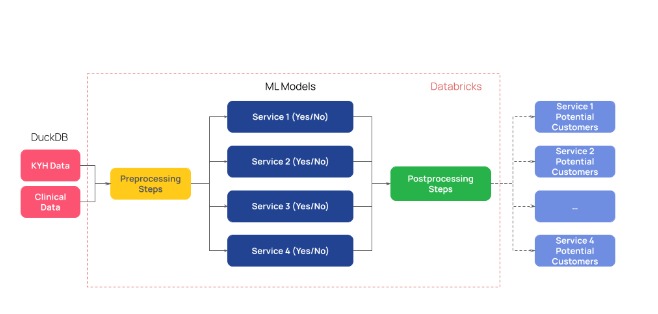Introduction
Business Challenge
Curebay’s operations include surveying non-metropolitan residents about chronic diseases and monthly medical costs—a rich dataset ripe for healthcare analytics and customer profiling to uncover untapped business opportunities. However, Curebay only had raw survey results and needed an intelligent solution to identify and rank the most potential customers for each service using a score. The goal was to turn survey data into actionable insights to target potential customers effectively, maximizing Curebay’s healthcare solutions’ reach and impact.
Solution
DataNimbus enhanced Curebay’s data capabilities significantly by implementing Databricks on Google Cloud, taking advantage of cloud-based analytics and predictive modeling to convert raw survey data into actionable insights.Before this, Curebay utilized Google Cloud with DuckDB on instances for their visualization backend. The transition to Databricks streamlined data management and analysis, integrating well with the existing setup. Following this, relevant tables were migrated to Databricks, forming a centralized data repository. A key part of the solution was the creation of a customer acquisition engine on the Databricks Lakehouse platform. This engine analyzed survey data to rank potential customers for each service, employing machine learning models to score and categorize individuals, converting raw survey data into actionable insights for targeted healthcare offerings.
Initially, the focus was on working with the training data. Relevant tables were extracted and preprocessed, and appropriate models were trained using Databricks offerings like MLflow, facilitating the tracking and management of the machine learning lifecycle.
Transitioning to the production phase, considering the client’s use of DuckDB, data snapshots were pulled daily to capture the latest survey results. These fresh data snapshots were fed into the trained models to generate predictions on potential customer ranking for each service.
The newly inferred data, which indicated the ranking of potential customers, was subsequently integrated into Curebay’s tables daily. This streamlined process transformed the raw survey data into a dynamic, actionable ranking system, enabling Curebay to better identify and engage potential customers for their healthcare services.

Value Creation
Efficient Customer Targeting: The Databricks-engineered customer acquisition engine revolutionized Curebay’s approach, infusing marketing intelligence and a refined healthcare strategy into their processes for targeting potential customers.
Data-Driven Insights: The solution transformed raw survey data into actionable insights, providing a clearer understanding of the non-metropolitan market dynamics. This data-driven approach empowered Curebay to tailor its offerings to meet these communities’ healthcare needs better.
Operational Efficiency: By automating the data processing and customer ranking process, the system reduced the manual effort required, speeding up the data-to-action cycle. This operational efficiency allowed Curebay to respond swiftly to market opportunities, enhancing its agility in the competitive healthcare landscape.
Scalability and Adaptability: The infrastructure set up on Databricks and the processes established are designed to scale with the increasing data and evolving business needs. Moreover, the setup allows for easy adaptation to new data sources or changing market dynamics, ensuring Curebay remains agile in its mission to bridge the healthcare gap in non-metropolitan areas.
Conclusion
Ultimately, DataNimbus and Curebay’s partnership exemplifies how operational excellence and a commitment to healthcare equity can be achieved through innovative data-driven solutions in India’s challenging healthcare landscape. By ingeniously leveraging Databricks on Google Cloud, a customer acquisition engine was crafted, turning raw survey data into actionable customer insights. This amplified Curebay’s outreach fortified its mission to bridge the healthcare divide, demonstrating a promising intersection of technology, data, and healthcare service provision.







